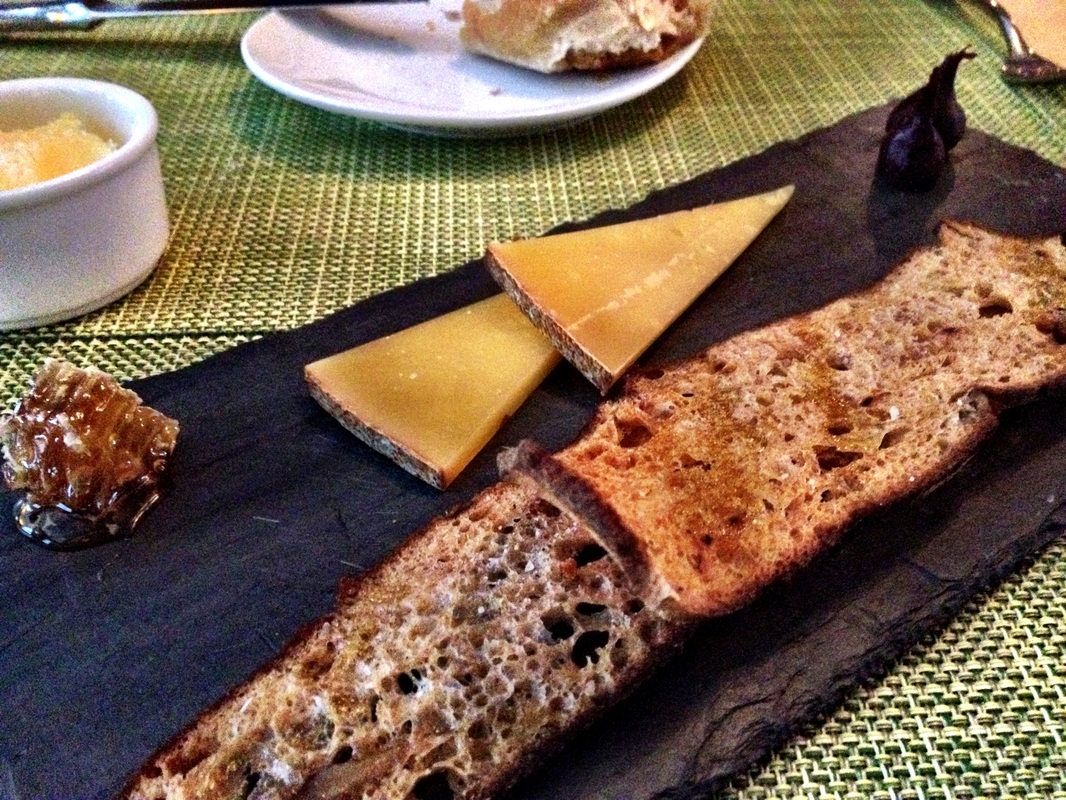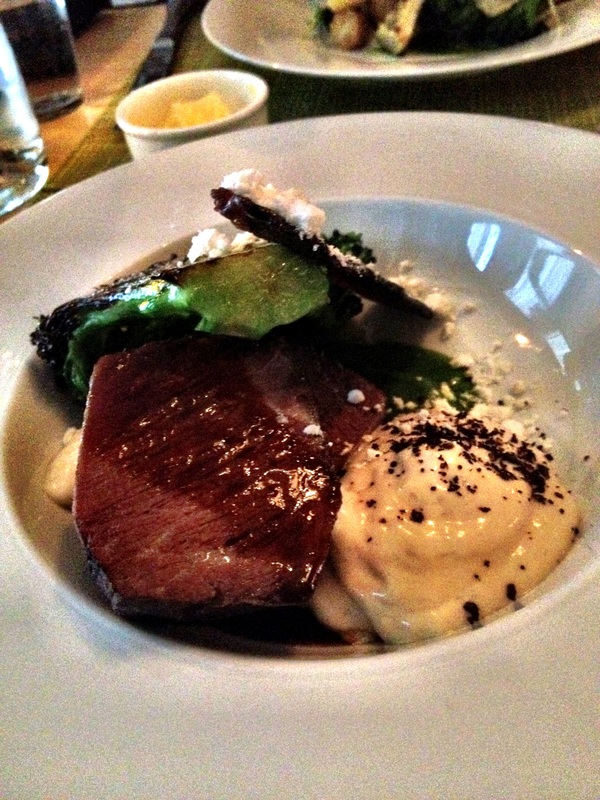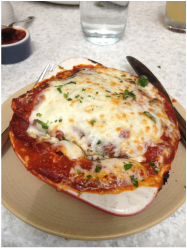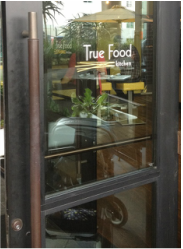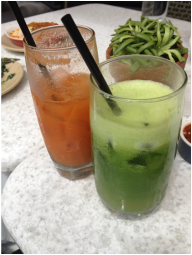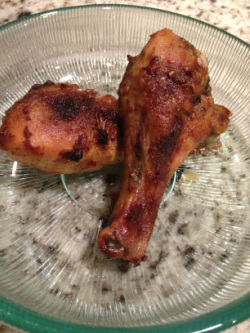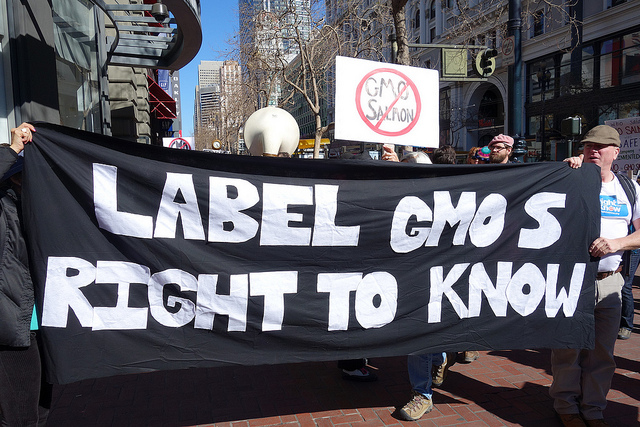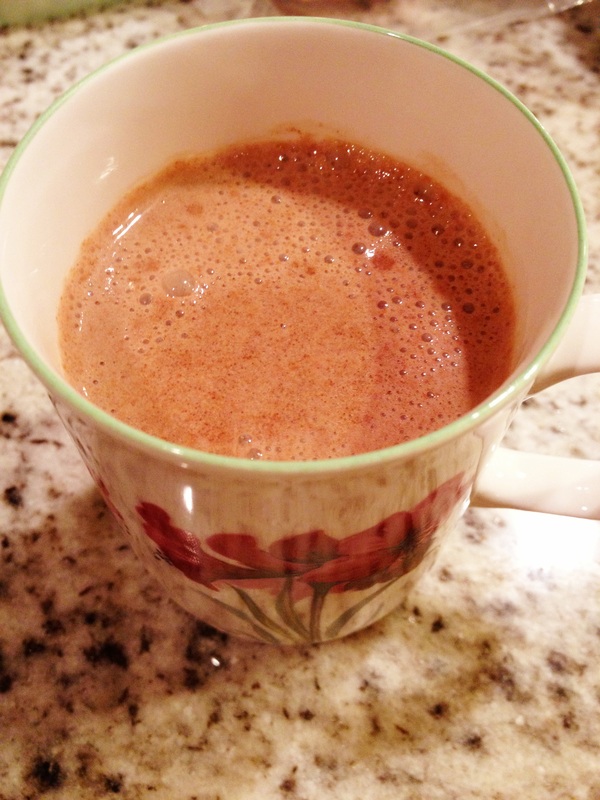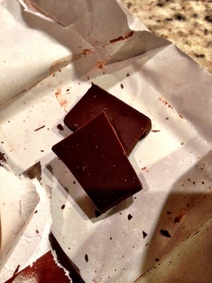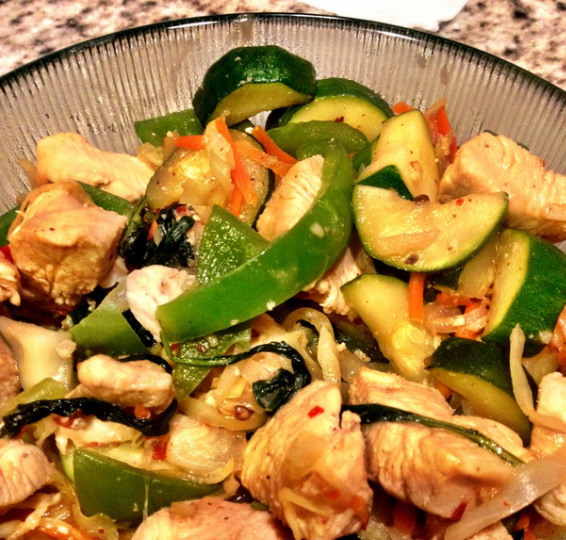Since it was my birthday, P of course chose a restaurant that was locally and sustainably sourced. The chef, Michael Leviton is part of the Chefs Collaborative, a nonprofit for chefs to use and spread their knowledge on sustainable foods. I love the idea behind Chefs Collaborative, but I often wonder whether education is the answer. Is simply learning about sustainable food going to encourage one to eat more of it? Like, are people not eating sustainably because they don't know enough about it or are there other factors at play? I have been thinking about this a lot, but I want to do more research to confirm what I think. I will get back to you in the next post.
This weekend P took me to Lumière for my 25th. It was amazing and so delicious. It was out in the suburbs, and at first, I wasn't sure what to expect. The restaurant didn't really have a scene, but I quickly realized it didn't matter because the taste and quality was to.die.for. I ordered the chicken, and P ordered the hake. I don't love fish, so I can't weigh in on the hake. But I can say, that if you are in the Boston area and get a chance to visit this place YOU MUST order the chicken. YOU MUST.
Since it was my birthday, P of course chose a restaurant that was locally and sustainably sourced. The chef, Michael Leviton is part of the Chefs Collaborative, a nonprofit for chefs to use and spread their knowledge on sustainable foods. I love the idea behind Chefs Collaborative, but I often wonder whether education is the answer. Is simply learning about sustainable food going to encourage one to eat more of it? Like, are people not eating sustainably because they don't know enough about it or are there other factors at play? I have been thinking about this a lot, but I want to do more research to confirm what I think. I will get back to you in the next post.
0 Comments
For some reason or another, I make a trip to CA every six months. Usually by the end of the trip, I appreciate the west coast for what it is and am ready to come back home. But this time, I just didn't want to part ways. I don't know if it was because I was so sick of Boston's cold weather or because I no longer craved the frenetic culture of the east coast or because everyone there seemed to have the whole illusive work-life balance thing figured out (or if not figured out, they weren't too worried about figuring it out). Maybe I romanticize the west coast too much in my head, but one thing I would definitely appreciate if I moved there is their commitment to organic/sustainable/farm to table/"whatever you want to call it" eating. While I was there Milan took me to AQ in SF. It was the first "just the two of us" date we've been on in years, literally. The restaurant not only changes its menu to source locally and seasonally, but it also changes its decor every season. It was beautiful, and a perfect place for us to catch up with a bottle of wine. Milan ordered a cheese plate to start, and the honey that came with it was divine. We forgot to ask where it came from (probably a result of the wine), but it definitely was something to write home about. I ordered the short rib, and it literally melted in my mouth. If you are in SF and looking for a nice meal (although a bit pricey), I would definitely recommend it. Later during the trip, I went to go visit my brother in LA. While he was taking a midterm, my parents and I went to Santa Monica to kill some time. (Side note: if I moved to LA, all I would do is kill time. I don't know how anyone is productive in a city with such beautiful weather). My dad asked me to pick the restaurant, and I think his exact words were "don't take me to any of that vegan natural foods shit again." So naturally, the restaurant that I took them to was called True Food Kitchen, which is based off of Dr. Andrew Weil's anit-inflammatory diet. Their ethos is that food should be both nutritious and tasty. My parents even liked the food, so it really couldn't have just been one of those bland "vegan natural foods" places. It was the perfect place for an outdoor lunch before going to the pier.
California is chock-full of places like AQ and True Foods Kitchen. I would love it if the east coast adopted even half of their food culture. Maybe it will happen slowly, but surely? I don't know. A girl can hope, I guess. I promised forever ago that I would post some quick and easy recipes that you can make when you only have 2 minutes to cook and eat in total. The drumsticks below are SO SUPER easy you don't even have to do anything. I almost feel like I shouldn't post it because now you all know how lazy I am, but they are so good that I don't even feel bad about it. What I do feel bad about is subjecting my roommate to me singing that part of the "One Week" song by the Barenaked Ladies while making these. You know, that interlude where it goes "chickty china the Chinese chicken. Have a drumstick and your brain stops tickin'." Anyway, another thing that I wanted to talk about was labeling. I know that my last post was on labeling, and you are just like how much can one person really care about the words pasted on to food packaging. But read on--it's interesting. A few months ago I went to this talk hosted by the Harvard Law Society on food labeling and it's implications (yes, now that I am in Boston I just casually drop Harvard, MIT, Brown, etc. into my conversations to make me seem smart). The panelist were talking about how food labels don't really mean anything. Something that says "all natural" on the label could mean jackshit, and could actually be full of a number of artificial ingredients. Even more interesting was that studies found that when people ate things that were labeled as healthy or all natural or fat free or whatever else that is perceived as "good for you," they actually ate more of it. So like for example, if someone ate oreos that were labeled as organic (organic oreos? whatever the fuck that means), they would subconsciously eat 5, whereas they would normally eat 2 of the non-organic oreos. Essentially, food labeling has a big impact on us whether we realize it or not. It frustrates me that companies stick these arbitrary "healthy" labels on things, and then make us pay more it for it. They are pretty much stealing money right out of our pockets. This is why I think, as a consumer, it would help us to : a) Shop more on the perimeter of the supermarket where things do not need to be heavily labeled because you recognize the ingredients in it (veggies, fruits, meats, cheese, eggs, etc) rather than the inner aisles which carry pre-packaged food, and b) Educate ourselves on the variety of labels that are out there. There is an excellent guide to labels published by Animal Welfare Approved: Food Labeling for Dummies. If you get a chance, I would highly recommend checking it out. It eliminates much of the confusion surrounding all-natural vs. organic vs. cage free vs. free range, etc. Chinese Chicken Drumsticks
1 lb chicken drumsticks 1 clove garlic, minced 1 tsp chinese 5 spice 1 tsp sambal olek (or more depending on the kick you want) 3 tbsp coconut aminos 3 tsp sesame oil 2 tbsp olive oil 1) Preheat oven to 400 degrees. 2) Combine all ingredients except for drumsticks in a bowl and whisk. 3) Pour ingredients onto drumsticks and marinate for at least 20 minutes in the refrigerator. I marinated for about 2 hours. 4) Place drumsticks on foil lined baking tray and bake for about 45 minutes. 5) Turn chicken over onto the other side and scoop up the sauce or from the bottom of the tray or from left over marinade and pour over chicken. 6) Bake for an additional 20 minutes or until cooked through. GMO labeling: Why it's important in the wake of the passage of the "Monsanto Protection Act"3/30/2013 You, as a food buyer, have the distinct privilege of proactively participating in shaping the world your children will inherit. - Joel Salatin, Polyface Farms Even if you are not going to read the rest of this post, please sign this petition to call on our government to mandate GMO labeling. Why is this important? That's what the rest of this post is about, so read on.
Last Tuesday, President Obama signed a bill called the "Consolidated and Further Continuing Appropriations Act, 2013." Normally, this wouldn't be a big deal because it's just a bill that provides funding to a bunch of federal agencies. However, within this bill there was a section, Section 733/735, which has been termed by people against Monsanto as the "Monsanto Protection Act" and people in support of Monsanto as the "Farmer's Assurance Provision." What is the Monsanto Protection Act? In a few words, this act 1) allows for growers to cultivate and continue to grow bitotech plants that have been previously approved by the USDA, but are now facing legal challenges due to questions about the safety of the GMOs (genetically modified organisms) or GE seeds (genetically engineered seeds) used in their production, and 2) prevents federal courts from banning the sale or cultivation of biotech crops even if studies and research shows that there are negative health, safety, and/or environmental consequences. Dave Murphy, the founder and executive director of Food Democracy Now stated, "[it] opened a new line of credit when they got this thing passed...It is basically a corporate handout to Monsanto." What does all of this mean? 1) Corporate Interests Over Public Safety: The evidence to support that GMOs are safe for public consumption in the long run is still inconclusive, but Monsanto, Dow, and other biotech firms can still sell to farmers and farmers can cultivate GMO crops. In essence, corporate profitability has become more of a priority than public safety. In fact, there are a number of sources that point to the potential dangers of GMOs, both in terms of health and environmental sustainability. I won't go into them too much here, but some of the studies are pretty shocking. 2) Shady Politics: The way this act was signed was pretty shady. First of all, many members of Congress that signed the bill did not know that it contained this section with the biotech rider because it was kind of hidden into the funding bill. Also, the rider was written in collaboration with Monsanto itself, so Monsanto had a lot of input into the language that was used in the rider. Lastly, the bill was passed so quickly that it did not go through review from the Agricultural or Judiciary Committees. 3) Potential for Increased Compromise of Consumer Protection: As stated by the International Business Times, "It set a terrible precedent...the message it sends is that corporations can get around consumer safety protections if they get Congress on their side." Corporations really don't need another avenue for them to manipulate the system. What can we do now? So the bill has been passed, and for the next 6 months the Monsanto Protection Act is in place. But that doesn't mean we are totally powerless. The next step, as a consumer, is to ask for all of the information. If our food is genetically modified, we should know -- we should call our government to action and ask that our food be labeled for GMOs. If you haven't already, please please please take a second to sign this petition on Food Democracy Now. 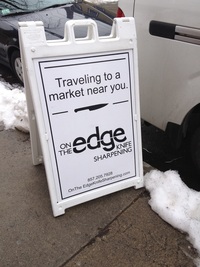 My favorite thing to do on a weekend afternoon is to wander through the farmer's market. On a lazy Saturday afternoon, I could spend hours looking for the perfect recipe to cook up all of my farmers market finds. Plus, I actually find cooking extremely relaxing, when I can just plug in some tunes and go to town in the kitchen. For me, eating healthy is not hard...when I have time.
Over the past two months, I was totally swamped at work (which is why my last post was in January) and eating healthy was SUCH a struggle. Because I was always stressed and tired, I found myself buying more processed/packaged foods, eating leftover pizza/cookies from lunch meetings, craving chocolate and bread all the fucking time, and cooking was like the last thing on my mind. About a month in, I was like okay, this is not working. I feel gross, and I just want to eat healthy again. So here are four hacks that I used to stay healthy: 1) Keep it simple: When you are busy, don't try to make magic in the kitchen. Instead, think about the following when you are deciding on what to make:
2) Plan your snacks: Okay, so this is clutch. A lot of days, I just needed to grab and go, and the easiest things to grab and go are pre-packaged foods. If you plan your snacks well, you won't have the urge to stick your head into the candy bowl around 2pm. I made sure to bring my snacks for the week with me to work on Monday. The weeks that I didn't have healthy snacks, I really struggled. What do I mean by planning your snacks well? Bring snacks to work that you will actually eat. Don't bring carrots and hummus, if you know you are not going to want to eat carrots and hummus. Here's what I brought to work to keep me from binging on cookies:
3) Get enough sleep: What does sleep have to do with eating healthy? I noticed that following the nights that I was sleeping five hours or less, all I wanted to do the next day was eat sugar. There is a bunch of literature about this on the internet, so I won't pretend to be a nutritional expert and go into the science behind it (you should do your own research). But my n=1 experiment proved to me that sleep deprivation gives me intense sugar cravings - that I am apparently totally powerless against. 4) Do small things: I realized that I needed to give myself motivation to want to cook after a long day at work, so I did something really small that made a huge difference. I got my knife sharpened. I know you are like what does that have to do with anything. Well 1) my knife was so dull that it took me forever to cut anything (plus it was also dangerous) and 2) it made cutting veggies kind of fun (i am a self-proclaimed dork, i know). What are small things you can do make cooking fun?
In the coming weeks, I'll be posting the super easy recipes that I made over the last two months. Stay tuned! 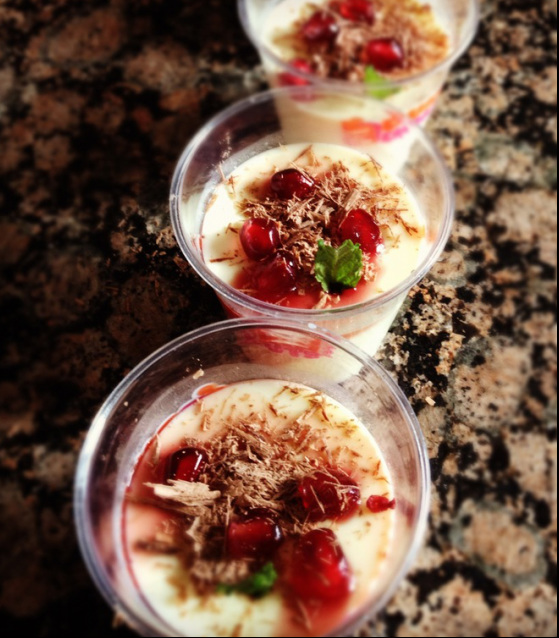 For our christmas party, my brother and I made a Pomegranate Panna Cotta. It was perfect for the holidays - a slightly tangy pomegranate syrup contrasted by an ultra creamy vanilla custard. YUM. My brother and I got the heavy cream from the Redding Terminal Market. When we opened it up the color was completely different than the heavy cream my mom had bought from Shop Rite, which made me think: Just how important is organic dairy?
Normally, I am of the opinion that buying organic is generally better because 1) you can be sure that what you are buying is free from chemicals, additives, hormones, antibiotics, etc, 2) you are reducing your environmental footprint, and 3) you vote with your dollar and increase the demand for better quality food. However, the cost of organic milk has been rising over the past few years and is at least double (sometimes triple) the cost of non-organic milk. So it begs the question of if it is worth the extra price? Should you buy organic dairy? Before I delve into the topic further, I will say that the key principle of buying organic is it is more beneficial to buy organic with the items that make up the majority of your diet. For example, I eat tons of kale and berries, but I rarely consume dairy. So for me buying organic kale and berries would make more sense than buying organic dairy. There are really two ways to look at this topic. 1) Organic milk from industrial-scale producers (i.e Horizon) vs. conventional milk From an animal treatment perspective, industrial scale producers of organic milk still keep their cows in CAFOs (concentrated animal feeding operations), very rarely let them feed on a pasture, and subject them to the same stressful conditions as factory farms. In essence, these dairy cows are diseased and depressed just like their conventionally farmed counter parts, but are just not loaded up with antibiotics. Environmentally, industrial scale producers of organic milk are still creating the same amount of waste and pollution, even if they are marginally better by eliminating antibiotic/hormone use. From a health perspective, all milk, conventional or organic, is tested for antibiotics before being sold to the consumer. Many people are concerned about traces of the growth hormone (rbST) in conventionally farmed milk, but there are conventional producers of milk that do not administer the growth hormone to their cows. Of course, the cost of non-rBST treated dairy is typically higher, but the premium is not as high as organic dairy. Also, organic milk is ultrapasturized to increase shelf life. There has been some evidence to suggest that the high heating temperatures of ultrapasturization actually reduces the quality of the milk and removes some of the nutrients. If given the choice between organic milk from industrial scale producers and conventionally farmed milk, I would say that the premium of organic milk is not worth the benefits. 2) Organic milk from small-scale family farms or co-ops of family farms vs. conventional milk Small-scale family farms generally have better practices, as a result of having the means to allow the cows space and land for pasture. Small-scale farmers tend to the land better, produce less waste, and have a human connection to the farm. However, being certified organic is a huge expense and takes time. If you find a small scale farm that is producing quality milk, but isn't certified organic don't rule it out. The cows on that farm might have even more grazing time than those on the farms that are certified, but the farmer might not have been able to chalk up the expense to get certified. This is why I think buying dairy from farms where the cows are grass fed is the best option. Although it may or may not be organic, you can ensure the cow was at least a happier cow than the cows that were unable to graze. In addition, grass-fed has it's own health benefits (higher amounts of omega-3 fatty acids and CLAs). If given the choice between organic milk from small scale farms and conventionally farmed milk, I would purchase the milk from the small scale farm. In my opinion, the order basically goes like this: Buy grass fed over organic and conventional. If you can't buy that or it's too expensive, buy organic from a family farm over conventional. If you can't find that or it's too expensive, buy conventional non-rBST treated milk. If you want a quick resource to see if the organic milk you are buying is worth it, The Cornucopia Institute has a great scorecard of organic dairy producers which you can find here. If you are interested in more information, they also have a great paper on Maintaining the Integrity of Organic Milk. 2012 flew by. I can't believe it's already time to celebrate a new year. It feels like I was making my 2012 resolutions just days ago. While bedridden with the flu, I've spent the last few days thinking about what I want the new year to bring and I thought I would share a few of my resolutions with you (if only to have it in writing and be accountable for them a year from now). 1) Take more risks. I feel like my 20s are years where it's okay to take risks. 2) Find the work that I can't not do. I know there is something out there that will allow me to go to bed feeling like I have made an impact on the world; I just have to find it. This year will be a year of self-examination and discovery for me. 3) Be grateful/accept things as they are. I am blessed with so much, but I tend to dwell on what could be better more than what is already good. There's a really good post on zenhabits (one of my favorite blogs) by Leo Babauta about how happiness lies in recognizing what you already have. I am going to strive to do that more in the new year. Taking the time to write down your resolutions and sharing them with others will help to make sure you stick to them. I would encourage you to email your resolutions to your friends or family. When this time next year rolls around, you will have something to reference as a benchmark to see how far you have come. I don't have a good transition from resolutions into the recipe, but my brother and I roasted this marvelous duck with a pomegranate red wine glaze for our holiday party. It was fantastically tender and succulent. We got the duck from the Redding Terminal Market in Philadelphia. It was so hectic before Christmas that I forgot to get the name of the farm. Although, they did tell us the duck was from Lancaster and antibiotic/hormone free.
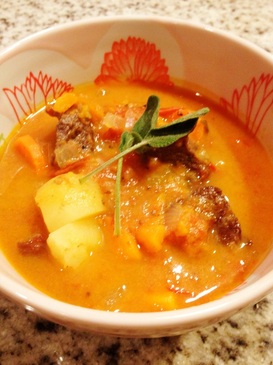 Okay, look, I try not to be that New Yorker (you know, the one who hates on Boston all the time), but it gets hard when you are living in the land of Uggs and American Eagle jeans. Since I came back from Miami/the Bahamas, I haven't been able to get over the cold - which consequently has made me have a not-so-positive attitude towards Boston. So I thought while I make this stew, instead of stewing over all of the things I don't like about Boston, I would make a list of things I do like.
1) It's really pretty. Architecturally, Boston is gorgeous. There is so much history here; it's actually very charming. 2) No more FOMO. Boston doesn't have as much going on. It's kind of freeing to not always have a fear of missing out. That's pretty much as far as I got. I know, that's a lame list. BUT I am hopeful that this list grows - just as soon as I get used to the cold. In the meantime, get used to me making dishes that will keep me warm. Coming back from Thanksgiving weekend has been rough. My cousin had his engagement party on a cruise to the Bahamas, and after a weekend of warm weather, I am just not liking this cold winter feeling going on in Boston.
I wanted something quick and hot to combat the cold. Since my oven still isn't working (and my management company is non-responsive), my options were somewhat limited. I remembered I had recently Evernoted* this recipe for a Paleo Chicken Stir Fry on The Healthy Foodie. I didn't have all of the ingredients, so I kind of improvised and ended up with something amazing. Literally. so. good. It tasted like really good Chinese food without the MSG. Who would have thought that to be possible? *If you are not Evernoting or using a similar kind of app/add-on, you are stuck in Web 2.0 buddy. Get with it and start streamlining your digital life. |

